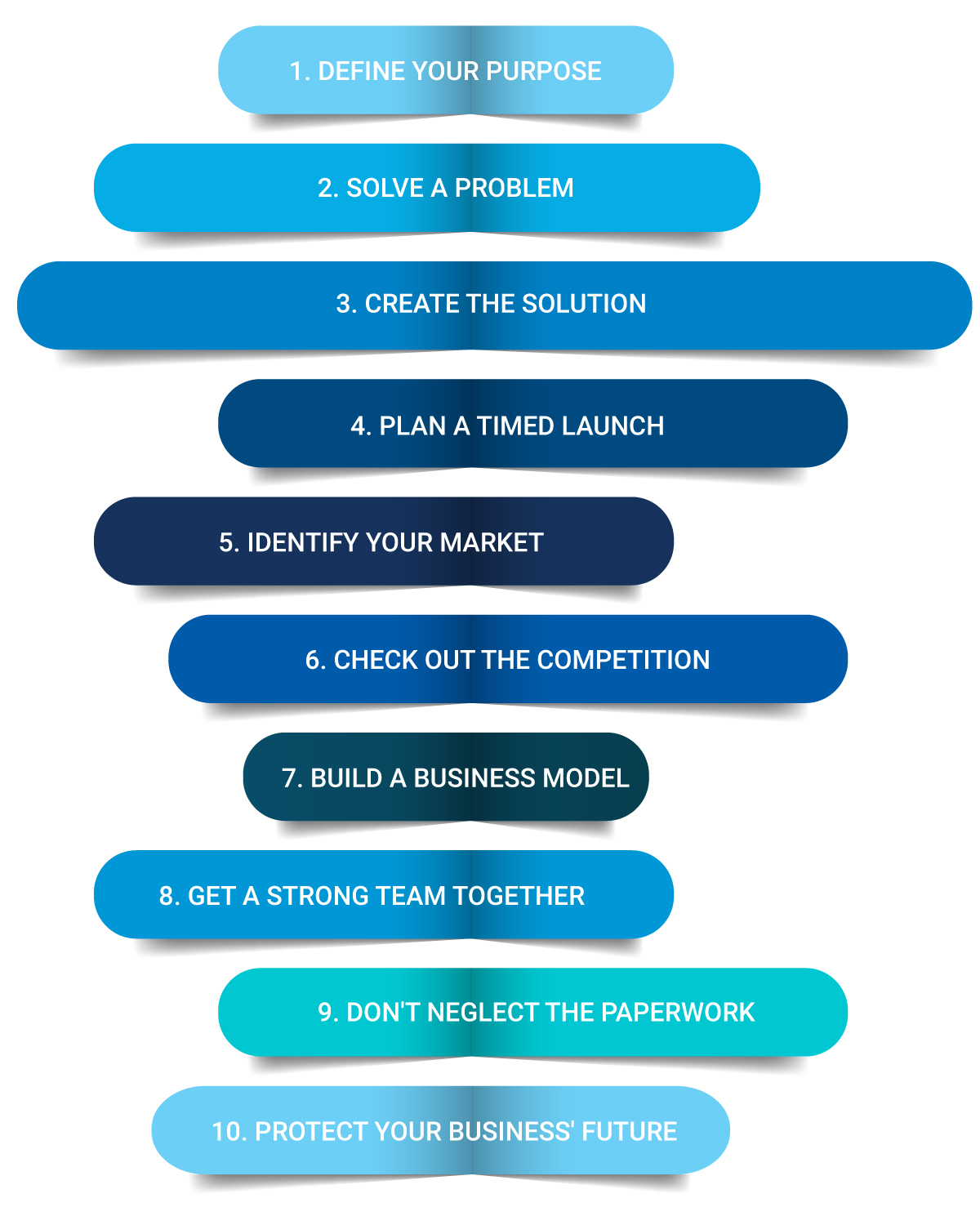
Are you ready to start your business with a bang? Building a successful business is an intentional process involving many facets. There are many elements to consider, such as your marketing plan, business plan, startup costs, and even business insurance. In this article, we look at ten things to do when starting your business based on the advice of successful business owners.

1. Define Your Brand’s Purpose
Your endeavour is about more than a business idea; it’s a vision with a purpose. But can your audience understand the purpose of your business? The first step you can take as a business owner to garner success for your business is to define your purpose clearly.
The goal is to be able to communicate clearly what you’re all about to your target market. Erin Carpenter, owner of Nude Barre, suggests writing down what your brand is and does and aims to do in five or ten sentences and testing it on people you’ve never met. Can they grasp your business’s essence?
Donnie Yamamoto, owner of Vital Pet Life, suggests answering the questions who, what, when where, and why. Then narrow it down until you have one strong sentence encapsulating your purpose. Being able to communicate your purpose in a mere sentence will help you reach more potential customers and build a customer base.
2. Solve Your Audience’s Problem
Great marketing materials and an effective message cannot compare with a product or service that delivers. Does your business idea solve a problem for your target market? The CEO of Narvar calls it “investing in solutions”.
Almost every type of business being launched today believes they are solving a problem. So what will make your business stand out from the crowd? It’s simple: Listening.
When you ask questions about what the problem is, your target audience may surprise you with insightful or challenging questions that could lead to innovations in your concept. If you take surveys and investigate the dynamics of the problem, it can help guide your product development process. Achieving business success will be easier when the audience is getting exactly what they’re looking for.
3. Create the Solution
Creating a solution is about finding something that will work to solve your audience’s problem. But you can’t assume that your point of view on the issue is the only way forward. Business partners, an unbiased audience, and other stakeholders or family members may offer valuable ideas.
It is also important not to try to solve all the problems you have discovered in your research in one go. Instead, you can aim to solve one small aspect of the problem at a time. If you’re careful and attentive to the issue, it can often lead to greater success in creating an effective and lucrative solution everyone wants.
4. When to Launch Your Start-Up Business
Sometimes, business owners can get stuck trying to solve problems that are in the future, distracting them from launching in good time. And when is that time? Sooner is better than later. Instead of worrying about scalability, it’s a better idea to first win over your first customer and keep them happy.
Yes, launch now, so that you can gain validity sooner. Another approach to timing your launch would be through active listening and market analysis. What you could look for is an industry with a looming disruption that many people in the industry haven’t recognised yet.
Of course, the truth is that finding the perfect time to launch is not something you can pre-empt. Whether you’re a family-owned jam company or are planning to launch digital products, you can’t predict the ideal time to launch. Thus, you can consider all the relevant variables, and then make the best choice for your business.
5. Identify Your Market
Instead of starting with an idea and finding an audience who cares, you can build your business ventures around a specific problem for a specific market. Identifying the market comes first, then the problem, and the solution your business is going to innovate. This ensures your business entity is filling a gap that actually exists in the market, leading to a greater chance for success.
6. Check Out the Competition
You can learn from the mistakes and successes of competitors in the market and industry you’re planning to enter. Sometimes, you can learn things about what potential customers find alluring or valuable, and other times, practical insights can help you enhance, for example, your business structure.
One of the best places to learn from competitors, even those whose products aren’t the same as yours, is in their marketing messaging. If their target audience is the same as yours, you can look at the words and imagery they use. How are they connecting with their audience to convert sales? This can teach you a lot and even guide your own approach.
7. Build a Business Model
Do you want a home-based business, an online business, or will your business type need facilities such as warehouses? Are you a sole proprietor, or are you starting a limited liability company? These practical questions feed into a business plan.
And your business plan is like a template for the pathway to its success. It’s a great idea to run your business plan past the most successful and smart people in your life.
8. Get a Strong Team Together
Your business plan template will stay a mere template without strong performers who can help your realise your goals. This is why hiring well is vital for your business’s future. If you hire someone who is not fully onboard with realising the dream, you risk losing a lot.
On the other hand, passionate people who perform well in the role they’re hired for can help you build a strong, successful business. With the right team backing you, success is achievable. But how do you hire correctly?
Leaders can consider hiring their opposites. This will help fill in gaps in the capabilities of your team. For example, a leader who is strong in sales can hire someone who is good at operations.
9. Don’t Neglect the Financial Statements
In other words, remain cognisant of how money is being spent in your organisation, where you’re investing, and how you’re building for a stronger future for the company. It’s easy to build bad cash flow habits at the inception of your business. Instead, start with healthy financial habits that will lead your business to an established financial future.
10. Protect Your Business’ Future
Protecting the future of your business means considering all the risks it may face and planning for ways to cover for these risks. Yes, a financial plan is key. And business insurance is also vital. If an unexpected event causes major property damage, will your business have the financial capacity to survive?
Everyone believes disasters only happen to other people, but the truth is fire, theft, burglary, and natural disasters are very real risks. Accidents, injuries, and third-party claims are also big risks to consider. You can find out more about what type of business insurance your start-up needs in our industry menu.


